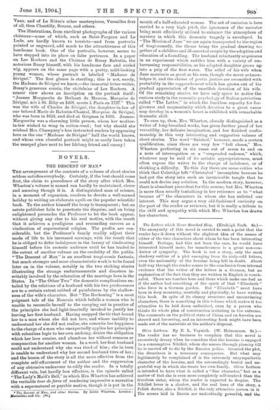THE DESCENT OF MAN.*
THE arrangement of the contents of a volume of short stories seldom satisfies everybody. Certainly, if the best should come first, the claim to precedence of the story after which Mrs. Wharton's volume is named can hardly be maintained, clever and amusing though it is. A distinguished man of science, in a moment of expansion, resolves to devote a well-earned holiday to writing an'elaborate squib on the popular scientific book. To the author himself the irony is transparent; but an astute publisher fails to penetrate the disguise, and on being enlightened persuades the Professor to let the book appear, without giving any clue to his real motive, with the result that it achieves a prodigious and resounding success as a vindication of supernatural religion. The profits are con- siderable, but the Professor's family readily adjust their mode of life to his increased earnings, with the result that he is obliged to defer indulgence in the luxury of vindicating himself before his esoteric audience until be has traded to the extent of another volume on the credulity of the public. 'The Descent of Man" is an excellent tragi-comic fantasia, but much stronger and more characteristic work is to be found later on in the volume, notably in the two striking stories illustrating the strange embarrassments and disasters in- evitably involved by the relaxation of the marriage laws in the States. In "The Other Two" the domestic complications en- tailed by the relations of a husband with his two predecessors are to a certain extent robbed of painfulness by the shallow- ness of the wife's character. But "The Reckoning" is a most poignant tale of the Nemesis which befalls a woman who is unable to reconcile herself to the carrying out in practice of the principles she had light-heartedly invoked to justify her leaving her first husband. Having snapped the tie that bound her to a man whom she did not love, and whose inability to understand her she did not realise, she commits her happiness to the charge of a man who unexpectedly applies her principles with relentless logic to her own undoing, denies the obligation which her love creates, and abandons her without remorse or compunction for another woman. In a word, her first husband could not understand why she was tired of him ; she in turn is unable to understand why her second husband tires of her; and the lesson of the story is all the more effective from the complete self-effacement of the author and the suppression of any obtrusive endeavour to edify the reader. In a totally different vein, but hardly less effective, is the episode called "The Lady's Maid's Bell," in which Mrs. Wharton has achieved the veritable tour de force of rendering impressive a narrative with a supernatural or psychic motive, though it is put in the • The Descent of Man, and other Stories. By Edith Wharton. London : Macmillan and Co. f6a.1 mouth of a half-educated woman. The art of omission is here carried to a very high pitch, the ignorance of the narrator being most effectively utilised to enhance the atmosphere of mystery in which this domestic tragedy is enveloped. In "The Mission of Jane "we are again transported to the region of tragi-comedy, the theme being the gradual drawing to- gether of a childless and ill-assorted couple by the adoption and education of a foundling. The husband reluctantly acquiesces. in an experiment which saddles him with a variety of em- barrassing responsibilities, as his adopted daughter grows up. into a prig of the first water. The relief of his wife when Jane marries is as great as his own, though she never acknow- ledges it, and the claims of poetic justice are reconciled with probability in the rapprochement which has grown out of his gradual appreciation of the unselfish devotion of his wife. Of the remaining stories, we have only space to notice the curious study in the romantic psychology of Italian patriotism called "The Letter," in which the limitless capacity for for- giveness and magnanimity which devotion to a great cause may develop in a woman's heart is exhibited with remarkable
dramatic skill. ,
To sum up, then, Mrs. Wharton, already distinguished as a writer of long-breathed works, has given further proof of her versatility, her delicate imagination, and her Anished crafts- manship in this very interesting and suggestive volume of short stories. The word 'finished," however, needs a certain. qualification, since there are very few "full closes," Mrs. Wharton preferring in six cases out of seven to end on a note of interrogation or a "suspended cadence," which, whatever may be said of its artistic appropriateness, must often expose the writer to the charge of indolence, or of shirking a difficulty. To this day there are some critics who think that Coleridge left " Christabel" incomplete because be had got the story into such an inextricable tangle that he could not devise any solution. In the modern story, however; there is abundant precedent for this course; but Mrs. Wharton is more than usually tantalising in her reticence as to "what became of" the characters in whom she has enlisted , our interest. This may argue a very old-fashioned curiosity on the part of the reader or reviewer, but it is really a tribute to the skill and sympathy with which Mrs. Wharton has drawn her characters.






































 Previous page
Previous page